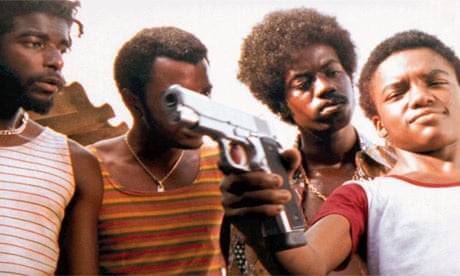This ground-level report on gang life in the slums of Rio de Janeiro exploded with thrilling and terrible force. An electrifying piece of cinema packed full of visual invention and dazzling set-pieces, it owes a debt to Martin Scorsese's Goodfellas and audaciously pays it off. Though it unfolds at an exhilarating pace and crackles with danger, the film never allows itself to become seduced by the abundant violence of favela life. Instead, it keeps its lens trained on the attendant horrors, which mount up as the narrative jumps forward in time. What is most horrifying of all is how those caught up in the violence – victims and perpetrators alike – keep getting younger and younger.
The film begins in the relative innocence of the late 60s, soon after the City of God (a real-life Rio slum, ironically named) was constructed. Rocket (Alexandre Rodrigues) is an 11-year-old at the margins of gang life. His older brother's crew are involved in petty crime, holding up trucks carrying propane gas and selling the loot to local residents. Things start getting out of control when Rocket's younger gang target the clients of a sleazy motel and the raid, intended to be bloodless, becomes a killing spree.
The film's most chilling image, revealed later on in flashback, is of the tiny Li'l Dice returning to the motel alone and gleefully slaying everyone inside. Flash-forward to the 70s and Dice, now restyled as Li'l Zé, is the most fearsome gang leader in the City of God. And yet even Zé, for all his psychotic tendencies, has a sense of order, and the favela is relatively peaceful once his reign is established. Other criminals are simply executed – or in one unforgettable instance, shot in the foot – if they cause trouble. But the peace is shakily constructed and warfare erupts on a massive scale as the film moves into the early 80s. When Zé meets his end, it's at the hand of a gang populated by nine- and 10-year-olds with designs on his drug-dealing monopoly. It's a profoundly disturbing sequence of events, but the film is still hugely enjoyable thanks to César Charlone's camerawork and the magnificent, sprawling cast of non-professional actors who were recruited from the City of God itself and adjacent slums.
Meirelles went on to direct The Constant Gardener and Blindness, but this film, with a co-director credit for Kátia Lund, is still his best by some margin. Look out for the bravura party scene, cut to Carl Douglas's Kung Fu Fighting, which marks the beginning of all-out war.
